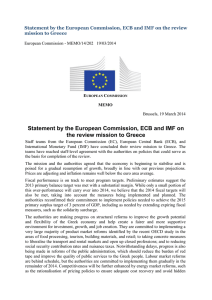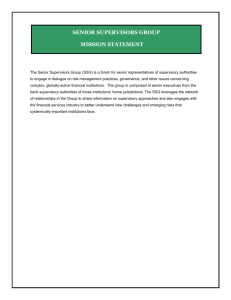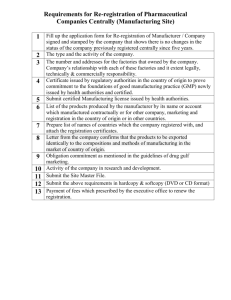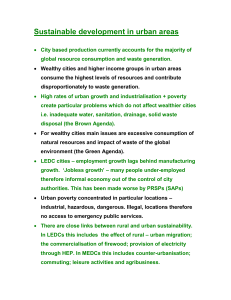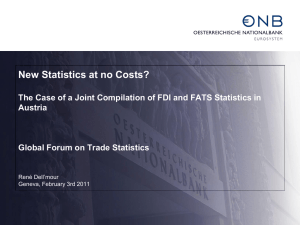14-5_pfranz
advertisement
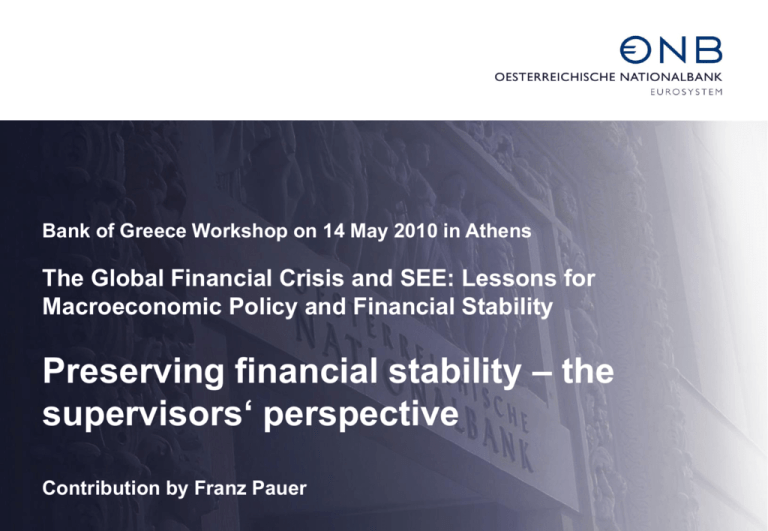
Bank of Greece Workshop on 14 May 2010 in Athens The Global Financial Crisis and SEE: Lessons for Macroeconomic Policy and Financial Stability Preserving financial stability – the supervisors‘ perspective Contribution by Franz Pauer Preserving Financial Stability: What have we not learned and why? 1. What do we know about financial crises? 2. What has hampered the transfer of knowledge into distinct action? 3. Conclusions The views expressed by the author do not necessarily reflect the official viewpoint of the OeNB. Bank of Greece Workshop 2 franz.pauer@oenb.at Many lessons learned from the recent financial crisis … • Address systemic risk adequately! • Improve supervisory co-operation (cross-border and cross-sector)! • Increase transparency of financial institutions and products! • Reduce the degree of leverage! • Reduce incentives for moral hazard! • Reduce short-termism in remuneration systems! … have already been drawn from earlier crises Bank of Greece Workshop 3 franz.pauer@oenb.at The general patterns of financial crises are well known • Excess liquidity is always at the origin of financial bubbles. Despite the fact that it is often used to finance per se economically sound developments (innovations), it leads to over-investment if too much capital flows into these promising investment opportunities. • Consequently, the marginal efficiency (profitability) of the capital invested declines. Given the expectation of future profits and (demand driven) asset price increases, this is, however, disregarded. • The emerging bubble is further inflated by declining risk-awareness and deteriorating risk management, rising moral hazard and increasing herding behaviour. • Finally, the bubble bursts, losses have to be realized, the euphoric feeling turns into a gloom-and-doom mood, the risk appetite declines dramatically and funding becomes extremely difficult. Bank of Greece Workshop 4 franz.pauer@oenb.at A few examples of financial crises economic reasoning (sound origin of signs of irrational investment opportunities) excess liquidity exuberances International debt crisis in developing and emerging countries, capital is the scarcest production factor “recycling of petro dollars” via banks investments are not made in the producing sectors or are not profitable Japan crisis deregulation improves the allocation of capital and its efficiency strong domestic credit expansion asset prices rise to absurdly high levels, 9 out of 10 largest banks are Japanese “New economy” bubble “first movers” produce new goods and services with prospects for high demand global excess liquidity market value of loss-making new economy firms soars Sub-prime crisis no basic economic innovation, only financial innovations used to disguise risk global excess liquidity, savings glut escalating indebtedness of private households in the U.S. SEE bubble freeing of market forces, catching-up potential, EU integration process liquidity inflow from foreign banks and FDI consumer credits expand fastest, high good will at bank acquisitions Bank of Greece Workshop 5 franz.pauer@oenb.at Despite the fact that financial authorities knew * from earlier financial crises what to do and * how financial bubbles generally develop they were not able to prevent the recent crisis! Why? Bank of Greece Workshop 6 franz.pauer@oenb.at Preserving Financial Stability: What have we not learned and why? 1. What do we know about financial crises? 2. What has hampered the transfer of knowledge into distinct action? 3. Conclusions Bank of Greece Workshop 7 franz.pauer@oenb.at Financial authorities took measures, but they had little effect • Regulators established new (complex) rules to prevent a repetition of preceding financial crises, however – regulated institutions immediately searched for ways to circumvent new regulations by moving (risky) business … – from regulated to non-regulated activities (e.g. from on-balance to off-balance sheet), – from highly regulated to little or non-regulated institutions (e.g. from banks to the shadow banking system including leasing companies) and – from countries with tougher supervisory regimes to countries with lighter regimes. Regulating risky financial activities is like chasing mosquitoes: Each time you think, you have finally caught one, it instantly appears somewhere else and continues its annoying activity! Bank of Greece Workshop 8 franz.pauer@oenb.at Financial authorities took measures, but they had little effect • Financial authorities have extended their macro-prudential analysis considerably (e.g. performing stress tests, publishing Financial Stability Reviews), however the results of the analysis – triggered only insufficiently effective supervisory action (see next points) or – triggered no intervention from financial authorities at all (for the reasons see slides 11 to 13). • Financial authorities issued recommendations and warnings (on the basis of their macro-prudential analysis), however – the instruments of self regulation and corporate governance controls in financial institutions turned out to be too weak to effectively implement supervisory proposals (e.g. best practices) and – in a situation of widespread market enthusiasm (irrational behaviour), warnings are ignored anyway. Bank of Greece Workshop 9 franz.pauer@oenb.at Financial authorities took measures, but they had little effect • National authorities took distinct supervisory measures to dampen developments that had the potential to lead to financial fragility in their respective domestic markets, however – the close integration of the domestic into the global market reduced the effectiveness of these interventions, – e.g. prudential measures to reduce excessive credit expansion of local banks were circumvented by increased cross-border lending of foreign parent banks. • Financial authorities have even extended formal cooperation on a bilateral and multilateral basis (e.g. MoUs, Lamfalussy process), however – the exchange of essential information and the implementation of joint measures remained the exemption (for the reasons see especially slide 13) Bank of Greece Workshop 10 franz.pauer@oenb.at Financial authorities were hesitant to take measures • Financial authorities wrongly assumed that all market participants behave rational and thus were too complacent in their attitude to certain financial products and to certain users, e.g. – they assumed that professional investors would not purchase financial instruments, which are extremely intransparent (e.g. structured products), – they were not sufficiently aware that many private households do not (intuitively) understand what risk actually means and thus tend to ignore it in the decision making process, e.g. when borrowing in foreign currency. In both examples we see a systematic under-perception of risk which would have justified (stronger) interventions of financial authorities. • Uncertainty about the existence of a financial bubble (new bubbles usually wear new masks) made authorities to postpone the decision to intervene. However, this was in fact a(n implicit) decision in favour of erring on the side of allowing too much expansion (following the approach of cleaning-up after the bubble has burst). Bank of Greece Workshop 11 franz.pauer@oenb.at Financial authorities were hesitant to take measures • Financial authorities usually face widespread resistance against measures directed at curbing irrational exuberances. Nearly all economic agents benefit (at least in the short run) from an ongoing bubble and do not like the party to be spoiled: – (Risky) borrowers have easy access to credit. – Owners of financial and real assets see the market value of their investments on a continuous upward trend. – The financial industry generates large revenues. – Companies’ profits are pushed up by strong demand. – The labour force benefits from increasing employment and income. – Governments enjoy rising taxes, falling social expenditure and easy financing for their favourite political projects. If you think that you are in paradise, you do not want to hear that you are right on the way to hell! Bank of Greece Workshop 12 franz.pauer@oenb.at Financial authorities were hesitant to take measures • National financial authorities show strong loyalty to “their” banks. This may conflict with the necessity to take financial stability measures if they are painful for (domestic) financial institutions. – In multilateral financial forums, national financial authorities tend to draw an overly positive picture of their respective domestic financial systems instead of openly discussing critical developments => global risks may be underestimated and potential spillovers may be overlooked – When new internationally binding financial rules are discussed, national financial authorities often act as lobbyists of the interests of their respective financial institutions (e.g. regarding competitive advantages or disadvantages) => weak and very complex supervisory regulations incapable of preventing future financial crises – National financial authorities are reluctant to “persuade” domestic parent banks not to circumvent lending restrictions imposed on their foreign subsidiaries => financial stability measures of host supervisors become ineffective Bank of Greece Workshop 13 franz.pauer@oenb.at Preserving Financial Stability: What have we not learned and why? 1. What do we know about financial crises? 2. What has hampered the transfer of knowledge into distinct action? 3. Conclusions Bank of Greece Workshop 14 franz.pauer@oenb.at Conclusions • There is a need for principal-based (less complex) regulations which have the potential to cover new developments, especially all attempts to circumvent them. This means that the rules are at the discretion of financial authorities (strengthening of pillar 2), which have to apply them and to take (proactive) decisions and measures. • There are (national) financial authorities, which are hesitant to intervene due to existing uncertainties, fierce resistance from vested interests, strong loyalties to their domestic banks, insufficient cooperation of foreign authorities etc. This causes a dilemma: Additional power should be lent to institutions which so far have shown little eagerness to use it. A possible way out could be a shift of decision making powers from national authorities to a supranational institution. The new European supervisory architecture could be a first step into this direction. Bank of Greece Workshop 15 franz.pauer@oenb.at
